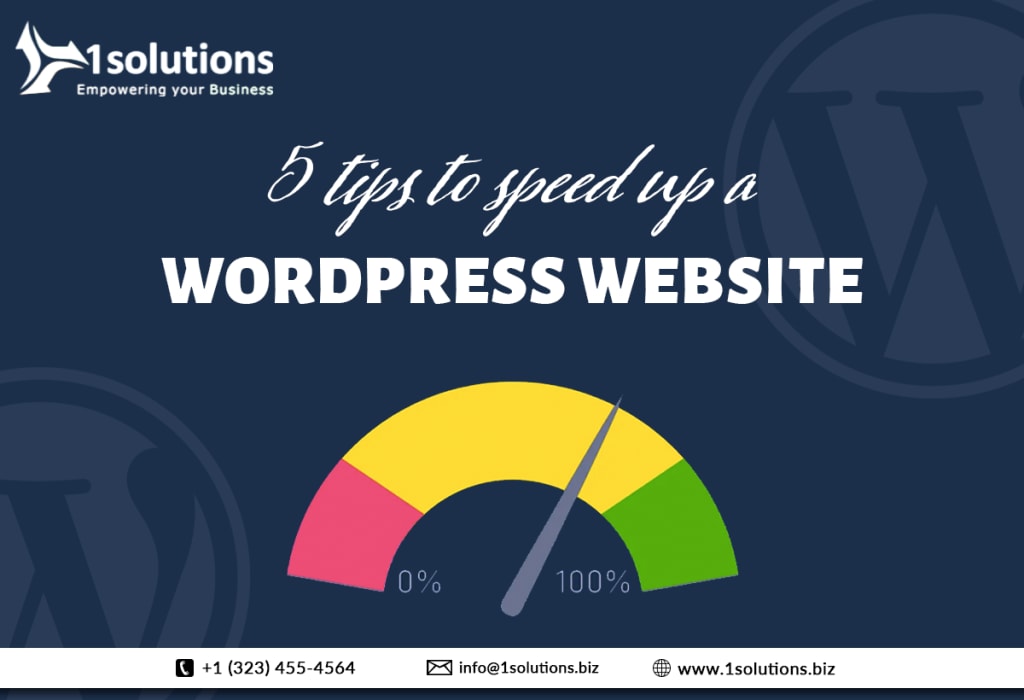Content warning
This story may contain sensitive material or discuss topics that some readers may find distressing. Reader discretion is advised. The views and opinions expressed in this story are those of the author and do not necessarily reflect the official policy or position of Vocal.
5 Tips To Speed Up a WordPress Website
In this blog post, readers will know about "5 tips to speed up a WordPress website

When websites are developed and implemented, several important factors are considered, ranging from theme and plugin selection to data collection.
However, one of the most crucial components on which developers focus is WordPress rate — ensuring that websites load and deliver content to visitors as quickly as possible.
“We've even seen WordPress development firms advertise fast location data rates as an important – sometimes known product, or sometimes as stand-alone services.’’
Site speed has also become critical for search engine optimization. It can be seen in Google's Core Web Vitals ranking, where "Largest Contentful Paint," or the connection speed for the page's main content, is one of the key considerations to rank pages on.
5 Tips for Increasing the Speed of Your WordPress Website
With so many working components, plugins, and files, it can be intimidating for a web developer to work on speeding up a WordPress site. But, as I'll explain further below, it doesn't have to be that way by taking small, effective steps and actions! Here are five suggestions for increasing the speed of your WordPress website:
1. Cache optimization
The cache is the best friend of some developers and the worst enemy of others. Cache, on the other hand, is frequently seen negatively, as it is frequently the source of storage and other related concerns. However, the advantages of cache are sometimes neglected.
Caching mechanisms are always running in the background on any device we use, whether it's a phone, a computer, or something else entirely, helping to save backups of the web pages we visit, and the settings we enter on a given site, and more.
“This significantly improves website load speeds because we no longer have to wait for a recently viewed site to load.”
This is particularly true in the case of WordPress, which is dynamic and involves several files.
When you load a WordPress site, it must essentially "cook up" the site from all of the resource base and file types in the backend, which can take some time, resulting in slower website loading.
“Caching plugins can help with this.”
These plugins could save the stationary HTML files of pages as cache, allowing the website to load these file systems first, making the overall site load faster and more efficiently. This is critical not only from an SEO but also from user experience standpoint, but also to help reduce server load.
While there are other such plugins available, WP Super Cache is an excellent example that I frequently use. It allows you to cache your site and build an HTML file that can also be provided when a person visits your site rather than running PHP scripts continuously.
There are various options for customizing cache settings, including which users to cache for (registered in/not logged in), how long to retain cached files and when to refresh them, which sites to cache, and even multiple caching algorithms that can cache an entire page or keep some bits dynamic!
2. Image optimization
Putting images on internet sites is an often-overlooked aspect of web development. Many websites have pictures of varying quality and size, ranging from low-resolution, low-size images downloaded from the internet to high-resolution, large-size images imported directly from cameras onto the webpage.
“After all, all you need to do is display the pictures and let the host load them efficiently, right?”
Unfortunately, this is one of the most common misconceptions about image uploading. Developers may overlook image file sizes (that can span from kilobytes to many megabytes) and finish up with slower sites as a result of overcrowding their webpage with large images.
There's always more information to load for the server in the end. Fixing this problem is critical not only for a quick and efficient website, but it may also make or break your website's SEO, as one of the primary factors Facebook and other search engines use to rank websites is how effectively the site and also its images are optimized.
“However, much like with WordPress sites, we can use plugins to assist us to solve this problem!”
Smush, a one-stop-shop plugin that assists in optimizing photos, whether JPEGs or PNGs, and assures there is no reduction in quality, so you can present the same images but more effectively, is my favorite among various image optimization plugins.
Smush is also highly customizable, allowing you to expand and contract up to 50 images at once, resize them if necessary, identify images that are starting to slow down the site, and sometimes even convert photographs to the next-generation WebP format.
You are no longer concerned about submitting large images or resizing them before uploading; simply upload how much you have and let Smush handle the rest!
3. Video offloading
When we first began developing web pages, we noticed that a substantial percentage of them hosted their site using video files.
This may be required for some sites due to legal or labeling reasons, but for the vast majority of sites, this was not the case.
They were simply sponsoring the videos with their own computer and playing them from there, without giving much thought to the problems that might arise.
Loading video files can consume a lot of storage and bandwidth, especially 4K videos that can be several GBs in size.
“What is the most effective way to prevent this? Examine video-sharing websites such as YouTube, Vimeo, and others!”
Why burden your server with hosting and presenting clips when you can do the same to YouTube/Vimeo and let them solve the bandwidth and delivery? They are designed with the sole aim of efficiently delivering videos!
The advantages of uploading to such services include the ability to offload the burden from your site but instead server and simply embed the YouTube/Vimeo link onto the website. Because your site does not need to load the video as well as the page, your web pages and video will load much faster.
“This is because the video is loading through YouTube.”
By offloading your videos to those services, you not only help cut down on your site, but you also gain other benefits, such as a smaller website backup file because it no longer contains videos, lower server costs because you don't require as much throughput, and the capabilities for your viewers to choose between different film qualities (capacity within YouTube/Vimeo, for example) based on their internet speeds.
As a result, the same 4K video does not load for everyone, but those with slower internet connections can view videos in 720p instead.
This way, you get not only a faster site but also a better user experience!
4. WordPress and plugin updates
Everything in technology, from hardware like phones and computers to software like your latest iOS/Android variant or even separate WordPress versions, requires updates.
Despite being an open-source project, WordPress is extremely well maintained, with regular updates based on security patches.
These updates aren't always just suggestions; they're often crucial to the security and reliability of your website.
Similarly, plugins and themes have always been updated on a regular basis for security and performance, as well as compatibility with the latest versions of WordPress. It is critical to stay on top of and up to date with such updates in order to ensure that your plugins work and are optimized for performance.
Simply add your WordPress and enable performance reviews checks, and you'll be notified whenever updates are released and which updates are pending, from wordpress themes to concepts and WordPress itself.
You can also process the information directly from the Hub dashboard, without having to go to the actual web backend, making the process of staying efficient... efficient!
5. PHP Updating
Along with updating apps and WordPress, we must also remember to update the underlying frameworks that power your WordPress blog, including PHP. We must stay up to date on all of these changes in order to avoid having slow and sluggish online sites with security flaws.
PHP must also be regularly updated for these reasons, in order to ensure better performance and security.
The latest release of PHP is the most recent iteration, which runs twice as fast as previous versions, providing significant performance improvements.
Imagine your websites taking twice as long to load — it would be a developer's worst nightmare.
Although most hosts use the most recent PHP versions, there may be some that do not. If they don't, you can always modify them on the system, using cPanel or your hosting company's control panel, or by contacting your hosting provider.
These are a few of the approaches, plugins, and enhancements that I use and think are worth sharing so that you can speed up your website as well. All of this comes together to help your websites load faster, improve SEO rankings, and stay up to date and safe.
About the Creator
Atul Chaudhary
Atul Chaudhary is a passionate blogger and covers digital marketing, web designing and development topics. He is the founder of New Delhi, India based web agency 1Solutions. When is he not working,
Enjoyed the story? Support the Creator.
Subscribe for free to receive all their stories in your feed. You could also pledge your support or give them a one-off tip, letting them know you appreciate their work.






Comments
There are no comments for this story
Be the first to respond and start the conversation.